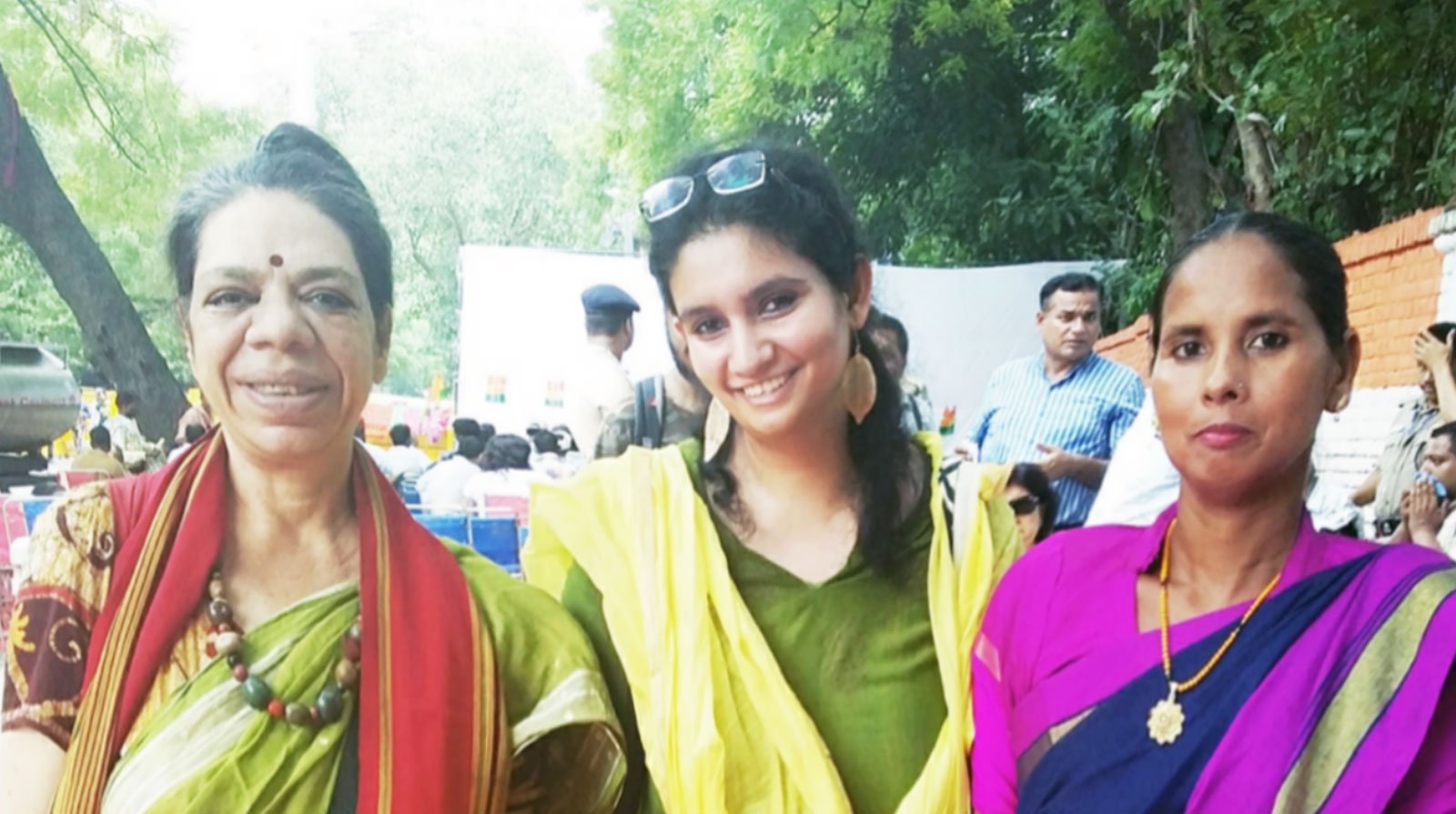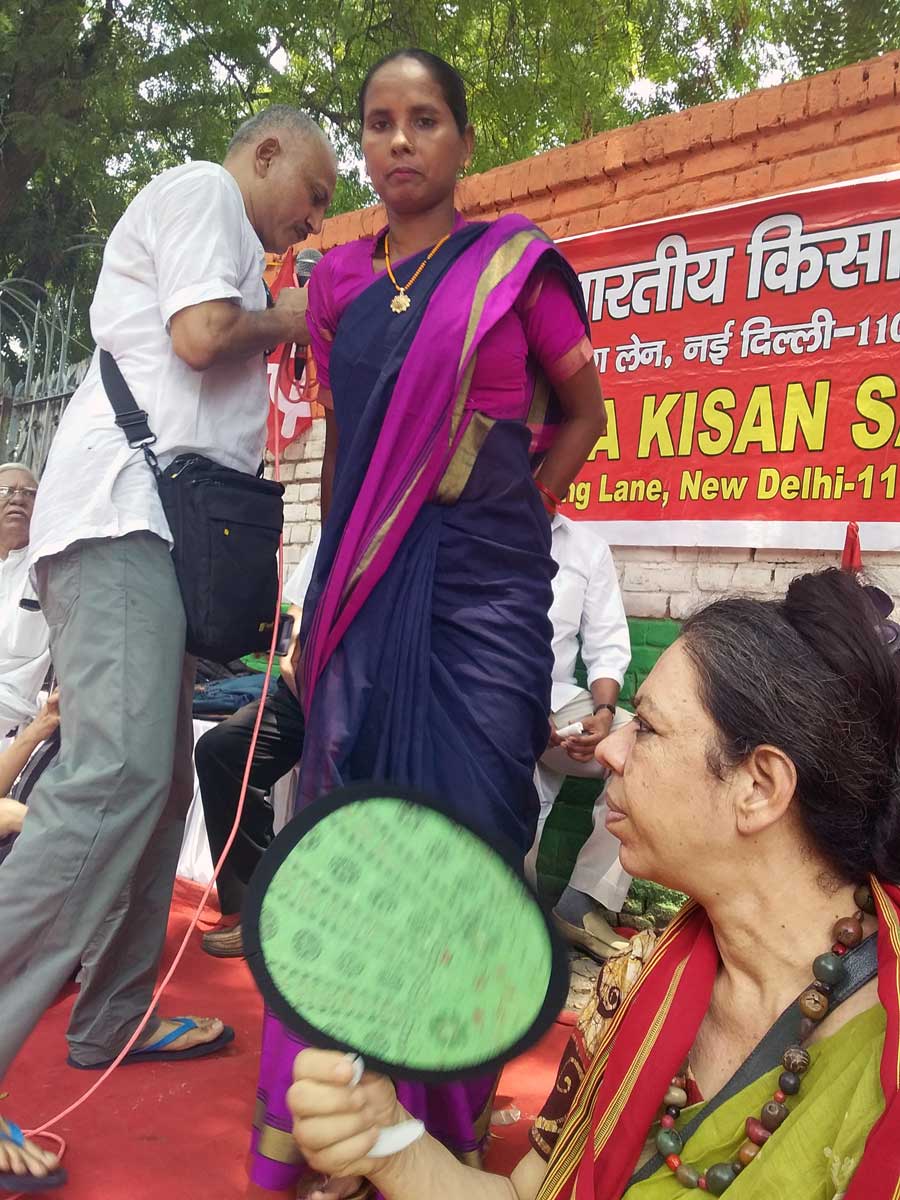Who is Afraid of the Forest Rights Act?
“First the white colonizer ruled over our forests. But with independence, only the skin color of those colonizing our forests has changed,” says Nivada Rana, as she shows the injury sustained in 2012 at the hands of Uttar Pradesh (UP) state authorities while collecting firewood in her ancestral forests. Nivada’s observation summarizes well the long history of forestry governance in India — where both the British Raj and the postcolonial Indian state have controlled forests at the expense of the millions of traditional forest dwelling Adivasi and Dalit communities.
Nivada is the leader of the Tharu Adivasi Mahila Kisan Mazdoor Sangathan — a women’s group of forest and farm workers from the indigenous Tharu Adivasi community in the Indo-Nepal Terai region. Her insightfulness stems from her decade-long activism to protect the forest rights of her community. Since the inauguration of the Dudhwa National Park in 1977, UP state forest department has attempted to evict and relocate residents of 37 villages in the area (including Nivada’s), primarily members of India’s marginalized Dalit and Adivasi forest dwelling communities, thereby retaining control of the forests using the excuse of wild life conservation.

In the face of such threats, the Scheduled Tribes and Other Traditional Forest Dwellers (Recognition of Forest Rights) Act, better known as the Forest Rights Act 2006, was meant to address the “historic injustices” perpetuated against the traditional forest dwelling communities. The Forest Rights Act (FRA) has provided legal teeth to Nivada’s struggle and that of million such forest dwelling communities across the country, protecting them against evictions and exploitation by corporations and a rapacious forest bureaucracy.
An Exemplary Law to Protect and Defend the Rights of Indigenous and Marginalized Women
As explored in our previous blog, the FRA has a tremendous, though often untapped potential, in empowering Adivasi and other forest dwelling people on multiple fronts. First of all, it financially empowers forest dwelling communities by recognizing individual land rights and granting community rights over the forest commons. This reorganization of the management of vast revenue generated by (non timber) minor forest produce — previously under the purview of state forest departments — along with community ownership of these resources has helped generate income and prevented the rightful inhabitants of the forests from being fined for encroachments.
Second, the FRA’s strong emphasis on the need for consent of Gram Sabhas — a village council that includes all adult members of the community — has been an important departure from Joint Forest Management (JFM) programs. Preferred by the World Bank in the early 1990s, JFM programs were re-invented by the Union Ministry of Environment, Forests and Climate Change (MOEFCC) in the form of forest department appointed Village Forest Committees, where the emphasis is on consultation instead of consent.
Third, the FRA’s radical reparative potential of addressing historic injustice is particularly suited to redress gender injustice with regard to land ownership in India. Unlike other patrilineal rules of land ownership in India, the FRA is singular in its recognition of women as having equal rights to forestland and community forest resources as their male counterparts. Ashok Chowdhury, the general secretary of the All India Union of Forest Working People, points out that this has significantly empowered married women, as well as widows, single women, and women deprived of economic security as a result of polygyny.
Finally, it is important to remember the ecological foresight of the FRA in explicitly acknowledging the vital importance of indigenous communities in conservation efforts, which was also recognized in 2018 by the United Nations Inter-Government Panel on Climate Change.
The FRA under Attack Again: Wildlife Trust & Others vs. the Union of India
Given FRA’s recognition of the important relationship women have with their land and ecological habitat, it is not surprising that they are leading the struggle to protect and implement this progressive legislation. The year 2018 saw Adivasi women farmers lead impressive marches to New Delhi and Mumbai, demanding the proper implementation of the FRA.

Despite the compounded risk of gendered harassment in addition to state intimidation, Nivada and Sukalo Gond of Sonbhadra are the two Adivasi women who have taken up the mantle of defending the FRA through legal channels. Along with 17 other academics, activists and environmentalists, these two persistent women have filed an application for intervention in a malicious case (Wildlife Trust & Others Versus the Union of India), lodged by an elite section of conservation groups and retired forest bureaucrats, challenging the constitutional validity of the FRA in 2008.
The petition against the FRA has undergone several contortions since 2008. After initially challenging the constitutional validity of the FRA, the petitioners demand the eviction of those whose claims for individual and community forest rights have been denied under the FRA. On February 13, 2019, a three-judge bench of the Supreme Court headed by Justice Arun Mishra issued an order in favor of the petitioners, demanding the evictions of almost 1.9 million Adivasis and other traditional forest dwellers (OTFDs). While a stay order till July 2019 was issued on the eviction notices, pending a re-evaluation of rejected claims by the state governments.
Meanwhile the MoEFCC and the Ministry of Tribal Affairs, which are the main respondents in the case, kept silent in the four hearings leading up to the eviction order. This lack of action tends to demonstrate the Union government’s disregard for the FRA and the vulnerable populations it is supposed to protect. After pressure from civil society groups (and ahead of the country’s general elections) the Solicitor General of India offered a feeble defense against the eviction orders, which inadequately recognized the inherently problematic nature of the petition.
The fundamental claim of the petition — representing Adivasis and other forest dwelling communities as being harmful to the environment — is completely misleading in the face of mounting evidence of their success as conservationists. Furthermore, if successful, an undoing of the FRA, and its model of community-consent based democratic forest governance could pave the way for “green grabbing” of forests by corporations. Most recently, this is being done by the Compensatory Afforestation Fund (CAF) Act (2016), which allows for the diversion of forestland for non-forestry purposes such as mining and construction, as long as those undertaking the project bear the cost of compensatory afforestation. This actively undermines the FRA because the funds for compensatory afforestation lie in the hands of the forest bureaucracy, and not the Gram Sabhas. Furthermore, unlike the FRA, the CAF act recognizes only individual land deeds, thus allowing for compensatory afforestation activities in the community forestland of vulnerable indigenous communities. Not only does the CAF act refuse to acknowledge community forest rights assured by the FRA and undermine the need of consent for gram sabhas, it adopts an unsound ecological outlook, by allowing monocultural plantations to be counted as forests. The draft National Forest Policy (2018) too had exhibited similar leanings towards financializing forests, by allowing for a public-private model of forest management in the name of “increasing forest productivity”, that disregards the role of its rightful owners — indigenous and traditional forest dwellers.
Most recently, barely two weeks after the SC issued eviction order, the MoEFCC sent a draft proposing alarming amendments to the Indian Forest Act (1927). These would grant the state forest departments untrammeled power in numerous ways. The rights of indigenous forest dwellers can be taken away if the department finds them to be in violation of its conservation aims. The amendment also allows immunity to the forest officials if they use arms against whomsoever they regard as encroachers. Making quite explicit its aim to financialize forests, the amendments also seek to set up a new legal category of “commercial forests” and promote production forests via involvement of private firms. These are all in contravention to the ecological and reparative justice that the FRA has sought to guarantee.
However, the FRA, which is a superseding act — it cannot be trumped by other legislation- has been a significant thorn in the implementation of such anti-poor laws. It is thus telling that the eviction order favoring an eleven year old petition undermining the FRA, a petition whose legal validity is extremely contentious, came barely a fortnight after a Supreme Court order (also co-issued by the same judge, Arun Mishra) released Rs. 540 billion ( US$ 7.75 billion) to the National Compensatory Afforestation Fund Authority for dubious purposes of compensatory afforestation . Also, by equating rejected claims with immediate eviction orders, the Supreme Court order disregards the numerous steps involved in the review and repeal process allowed for by the FRA. Already 8 state governments in India have submitted affidavits acknowledging that the rejection of claims made under the FRA has been flawed and inaccurate. The haste in seeking to evict some of the most precarious people in the country from their ancestral homelands, by the Supreme Court of India, without any regard to due process, calls for the mobilization and solidarity of human rights and environmental defenders in India and globally.
Jung Jaari — The Struggle Will Continue
Following a National level consultation on Land and Forest Rights in early July that saw participation from almost 200 forest movement leaders from across the country, ahead of the hearing of the anti FRA petition, a protest action against the Supreme Court eviction order was organized on July 22, 2019 in almost every state in India. The hearing, which had been scheduled for July 24, has been deferred continuously for a fortnight and is now scheduled for hearing on August 6, 2019. While Sokalo and Nivada, the two Adivasi petitioners in the case had travelled vast distances to appear for the hearing in Delhi, the burden of the incessant delay has necessitated their return home.
However, as Roma Malik, the deputy general secretary of the AIUFWP tells me at the Delhi protest meeting, the struggle for forest rights extends beyond the outcome of the present hearing. It must address the hurdles in the Act’s implementation that Adivasi and forest dwelling communities must contend with everyday. This may result in a nationwide march to the Indian parliament in Delhi in November, which could see participation from hundreds of thousands of marginalized forest dwelling communities.
In the meantime, it must be remembered that the struggle of the Adivasi and forest dwelling communities is not a domestic matter for India alone. While emphasizing the troubling global pattern of treating “indigenous peoples and local communities… as squatters when in fact the land is theirs,” the UN Special Rapporteur on the Rights of Indigenous Peoples, Victoria Tauli-Corpuz, has strongly emphasized that the basic premise of the eviction order is wrong.
Furthermore, the Indian Union Ministry of Environment, Forests and Climate Change must be urged to refrain from making the recently proposed amendments to the Indian Forest Act that further the colonial legacy of diminishing the rights of traditional forest dwellers, while excusing forest departments from any accountability. Lastly, India’s National Forest Policy and progressive conservation groups in the country must also recognize the vast benefits of genuine decentralized community-led forest governance for the environment, as well as democracy at large.
International civil society must continue to demand that the government of India not only defend the FRA, a progressive legislation that protects traditional forest dwelling communities, but also ensure its careful and widespread implementation.
